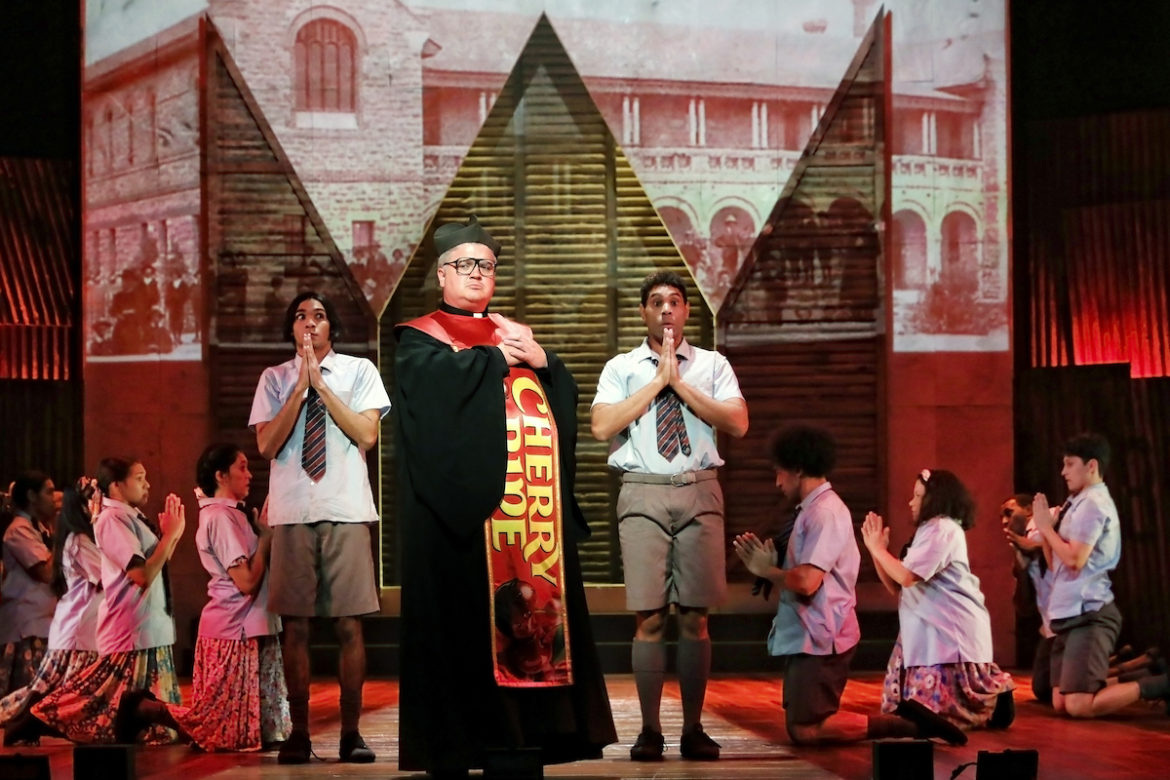Back in a sparkling new production for its 30th anniversary, the classic Aboriginal road musical Bran Nue Day reveals a bleeding heart beneath its smile, says Monique Grbec
The vision of incoming artistic director Iain Grandage for the 2020 Perth Festival is “to honour the Indigenous bedrock on which Australian cultural practice thrives”. The first week of the program is dedicated to First Nations performance, and what that reveals is the diversity of contemporary Indigenous expression. If we listen with heart, we hear the voice of idealism as it seeks to be recognised in a world soiled by colonisation, capitalism, and the White Australia policy.
The award winning Bran Nue Dae debuted at the 1990 Perth Festival, and returns to Subiaco’s Regal Theatre for its 30th anniversary. It is Australia’s first Aboriginal musical play. A semi-autobiographical coming of age romantic comedy by Jimmy Chi and his band Kuckles, it’s a metaphorical road trip though 1960’s Western Australia. Most awesomely, it’s a platform of Aboriginal voices that capsises the cultural status quo.
If you think life is hard, imagine a life where your familial identity is denigrated and dismissed. Bran Nue Dae uses the toe-tapping energy of rock-n-roll, gospel, country, blues and Broome saltwater music to tell the story of Willie (Marcus Corowa) and his journey from Djarindjin and innocence to The Temple of Soul Boys Home, and finally back home to Djarindjin.
‘If we listen with heart, we hear the voice of idealism as it seeks to be recognised in a world soiled by colonisation, capitalism, and the White Australia policy’
Before a backdrop of tall ships, a shadow of a man hobbles across stage. Uncle Tadpole, performed by Ernie Dingo, sweetens his loneliness with his smooth, deep crooning, but no amount of sweetness can take the sting out of the lyrics of his song. His eyes of fire challenge the audience as we hear wounds open and a voice bleeding: “white is right… the struggle of becoming an acceptable coon…” Uncle Tadpole has followed the rules until the rules ruled him out. Out of pain, wings unfurl from Tadpole’s song. He can’t be their “prototype white”.
From images of skies and a muted palette of browns, greys and pastels, Mark Thompson’s backdrop opens to reveal the steeply-pitched peak of a church roof, The Temple of the Soul boys’ home. Father Benedictus (Andrew Moran) descends the stairs, his nasal German accent accessorised with a pure white robe and a sauntering step. Here is a clean man, a man with a cane and a mission to do God’s work: to save the “starving blacks” who are “crying in the wilderness”.
Within the boys home, surely the soul of the contemporary temple, is a brightly lit fantasmagorical tuckshop fridge full of red soft drink cans and Cherry Ripes, their red and yellow mirror-finish glistening like treasure in a chest. Willie and his school friends raid the fridge. Unfortunately, dampening their joy, Benedictus appears with a disco-shimmering Cherry Ripe sash hanging on the front of his white robe. I imagine Uncle Chi’s delight, and his reverberating chuckle matching mine.
Willie, kicked out of The Temple, meets Tadpole living rough. The two generations bond and they decide to return to Broome together. Mark Howett’s lighting design sprays a city magic from dappled light, to green, and orange, and finally – as the speed of the city takes us to red – a whitewash flash evokes the crash of a Kombi van.
Tadpole works his charm on the two hippies in the van, Marijuana Annie (Danielle Sibosado) and German tourist Slippery (Callan Purcell), and together they all drive to Broome. The journey is tedious, with Slippery confused about how he should address Tadpole: is it Aborigine, Aboriginal, coloured, native people, Indigenous? Then, when they are pulled over by a couple of outback police, the seriousness of the situation hits Willie: “our people die in jail”.
Safe and back on the road, they reach a Broome pub where Willie’s childhood sweetheart Rosie (Theresa Moore) is singing. Reunited, and back in Djarindjin for a gospel baptism ceremony, Tara Gower’s wonderful choreography seamlessly blends a mix of traditional and Western dance.
As much as the finale appears farcical (no spoilers) the reality of the Stolen Generation is that there are a lot of children who were taken from their Aboriginal parent and placed into white families – children who knew they were different but were never given access to their biological or cultural identities. Regardless of how “prototype white” these children become, behind their charismatic white-is-right smiles is the heartbreak of disconnection: a coconut heart that bleeds.
Bran Nue Dae by Jimmy Chi, Michael Mavromatis, Stephen Pigrim, Garry Gower and Patrick Bin Amat from the band Kuckles. Musical Director & Indigenous Advisor Michael Mavromatis. Musical Director Patrick Bin Amat. Director Andrew Ross. Associate Director Naomi Pigram. Set and Costume Design Mark Thompson. Choreographer Tara Gower, Lighting Designer Mark Howett. Sound Designer Michael Waters. Band Patrick Bin Amat, Mia Brine, Ben Ingvarson, Manny Mavromatis. Performed by Ernie Dingo, Marcus Corowa, Teresa Moore, Andrew Moran, Danielle Sibosado, Callan Purcell, Ngaire Pigram. Presented by West Australian Opera. The Regal Theatre till 15 February 2020. Bookings
- Roslyn Packer Theatre, Sydney 16 April – 3 May
- Geelong Arts Centre 4 June – 7 June
- Comedy Theatre, Melbourne 12 June – 11 July
- Qpac Playhouse Theatre, Brisbane 24 July – 2 August
- Canberra Theatre 11 August – 16 August
- Her Majesty’s Theatre, Adelaide 19 August – 23 August

